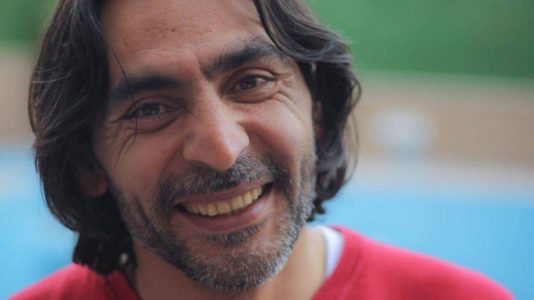
Syrian activist killed by the Islamic State was working on British-backed comic
A prominent Syrian activist was editing a children’s magazine that was being published as part of a covert British propaganda campaign when he was murdered by the Islamic State (IS) group in Turkey.
Naji Jerf was the editor of al-Hentawi, a comic magazine that had been devised as part of a campaign run by a communications company under contract to the UK foreign office in London.
It was aimed at 9 to 15-year olds and had been devised as a “counter-recruitment magazine” in response to IS’s own propaganda efforts, according to an internal review of what the British government termed its “strategic communications” (or “SC”) in Syria seen by Middle East Eye.
Jerf was editor of al-Hentawi when he was shot dead in Gaziantep in southern Turkey in December 2015. A member of IS was subsequently jailed for life for the murder.
UK foreign office staff believe he accidentally geolocated himself while using his mobile telephone when buying food for his wife and two young daughters in a restaurant in the city.
Jerf, 38, was a prominent figure in opposition circles. He had trained a large number of citizen journalists in Syria and had been involved in the Raqqa is Being Silently Slaughtered campaign, in which activists worked undercover in IS-held territory to document the militant group’s abusive rule.
Jerf was assassinated in the same month that IS killed two activists in the southern Turkish province of Urfa. Both were working for Raqqa is Being Silently Slaughtered.
“Jerf was one of the founders of citizen journalism in Syria. He produced works early in the revolution, and participated in countless projects,” Sultan Jalabi, a journalist who worked with him for several months, told MEE.
Hasan Borhan, a former editor of a French-based Syrian news agency, added: “Jerf trained hundreds in citizen journalism, creating a complex network in the east of Syria monitoring [human rights] violations.”
He went on to say: “The opposition is poor and cannot build integrated press institutions. All sectors of the revolution since its inception in 2011 are funded from abroad,” adding that the “source of Jerf’s funding does not change anything of his person or the importance of his works and their impact.”
Jerf was aware that his wider work had put him in the sights of IS: he had been about to leave Turkey with his family, having been granted asylum in France after facing a series of death threats.
His widow, Bushra Qashmer, now lives in France. She declined to talk to MEE, saying that she avoids talking to all media outlets.
Jerf’s brother Muhammad said his application for asylum in France was initially rejected, and subsequently approved through an appeal.
Although some citizen journalists working in Syria did not realise that their work was being sponsored through British government contracts, MEE understands that Jerf was aware he was working for a UK government project.
Amal Salamat, a Syrian journalist, said Jerf always thought carefully about ways to protect journalists and to seek the release of prisoners of conscience.
When Syrian intelligence arrested her husband, the journalist Jihad Mohamed, Salamat said she had received significant moral support from Jerf.
Salamat said: “Jerf published an article highlighting the arrest of my husband, in Hentah, a local newspaper he ran… Sources of financing certainly affect editorial policy, but Jerf’s work has been neutral. Knowing the source of the funding does not alter the value of his work.”
Source: Middle East Eye





